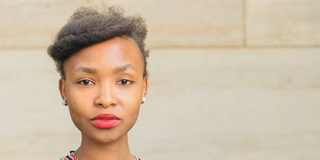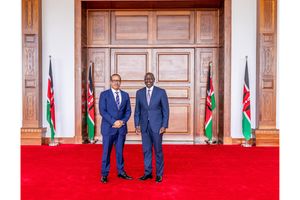Self-belief is key to succeeding in tech world, says Khalila

What you need to know:
- Khalila was always laughed at or completely sidelined whenever she came up with ideas to solve certain problems. However, she wasn’t deterred by any of this
Sustainable Development Goal 5 focuses on achieving gender equality and empowering all women and girls.
Set in 2015 with a deadline for 2030, we are now left with seven years to realise it, but with so many issues at the table, ranging from global pandemics, economic crises, climate emergencies, political instabilities, and war, the hubbub created by these issues has very quickly put certain goals on a back seat.
Around the world, we hear cases of an array of issues and somewhere along the road, we lost track of the very injustices and inequalities that led to SGD5.
We have vehemently pushed for equality in the workplace and equal access to opportunities. But equality without equity is all bark and no bite, and the more male-dominated a space is, the harder it is to find that equity.
Ms Khalila Mbowe, founder of Unleashed Africa Social Ventures, has a fiery passion for empowering girls, leverages technology to achieve these goals, and has dedicated her energy beyond just creating platforms.
“I’ve always been drawn to creating solutions and fixing problems. In my journey into tech, I was always the odd one out and whenever I came up with idea ABC to solve problem 123, I’d either get laughed at, jeered at, or completely sidelined,” Khalila narrates as we settle in to chat.
“I was openly bullied in school for ideas that I had and this was an unfortunate situation that I found myself in, not just at school but even at home. I was called ‘mbishi’ because I refused to believe that I couldn’t do something.”
The constant shunning and putting down that Khalila endured led her to grow up believing she was rebellious and the black sheep of her family. This led her to a point where she was able to affirm herself that if she truly wanted to be an innovator and problem solver, then she had to believe that her ideas were valid, especially in the tech space.
“As a woman, my ideas are valid. When I step into a space and I want to make a contribution, I shouldn't hesitate,” she shares.
“I remember once, just after we’d started, we had a few people come by, asking about what we do, and I would share with them without always revealing that I was behind it. During these visits, one woman told me that it would never succeed as it was too ambitious of an idea, and when I told her the founder was a woman, she was even more convinced of her conclusion.”
Khalila had to deal with even nastier comments and assumptions that she was either married to a rich white man or perhaps studied abroad, and the mere idea that a young Tanzanian lady who had studied right here could dream up something potentially impactful at the time was simply unfathomable.
“These women were talking amongst themselves and having a really negative conversation about me; how I’d never succeed and how it's not something that Tanzania is ready for, or that you can never mix technology and the creative economy – it is not something that we're ready for. It's not even ambitious; it's just impossible.”
They were talking about how a lot of young women fail because they have their heads up in the clouds. “So I'm standing on the side and it's taking all within me not to respond. It took a lot for me to venture into the tech space, even before Unleashed Africa, and to believe in myself, believe in ideas that I have, and a lot of intentionality to start to understand myself.”
“We’re here talking right now about technology, yet there are people in my family I could never tell, and I grew up thinking that me being a woman was a problem,” she shares.
As a result, Khalila hated being female and being African. “I used to think if I was born elsewhere, I would have a lot more chances. A lot of intentionality went into starting to understand what I brought to the table, because there were times when I’d go into conversations and think it's a conversation that I can't touch, or that I'm not allowed to talk about, because those are mental models that were brought up as I grew up.”
Khalila’s experience has highlighted the role of parents, society and the education space in hampering creativity, especially for girls.
Things did begin to look up when she had the opportunity to join the Young African Leaders Initiative (YALI), and being part of the first cohort in the programme, she entered the realm of ideas and networking that she’d been yearning for.
The networks she made became instrumental in propelling her to the platforms she needed to learn from, one such being the Raisina Dialogue, which is India’s premier conference on geopolitics and geo-economics which sees leaders in politics, business, media, and civil society converge in New Delhi to discuss the state of the world and explore opportunities for cooperation on a wide range of contemporary matters.
“So here I was, in the same room with presidents, and we're talking about how technology can be used as a tool to unlock some of the global opportunities, and we're talking about multilateral agreements across the globe,” Khalila shares.
“I was in the midst of people who were dreaming and envisioning development, and I felt that I belonged there. That gave me a lot more encouragement to come and start developing and creating because we knew there's a problem and we're finding a way to solve it with technology as our tool. I decided that I was going to build a tool that solves these problems and as long as you understand the problem, you will understand my solution, and we will build it together,” she adds.
“We talk about technology like it's this big pillar or pedestal, but in reality, technology has been evolving, growing and changing over the years.” Unleashed Africa was born of this understanding and within it, the Rise Up platform, which is a tool driven by the tech for gender agendas was built and caters to girls and women. It is a digital safe space where women, adolescent girls and young women can easily access curated opportunities and information to help them make informed decisions on health, entrepreneurship, upskilling and other livelihood-related information.
It is also a platform where they can get access to counsellors as well as report abuse should they go out and counter it.
The journey was not all smooth and even after setting up, Khalila had to learn and navigate the tough lessons that came with being in the space she had chosen. The stark differences she’d observed between the growth of tech-enabled ventures in other countries she’d visited, in comparison to Tanzania, presented a hopeful situation, but as she quickly came to learn, it is all easier said than done.
The biggest obstacle that she observed is the existence of “a poisonous spirit of comparison” in the tech ecosystem, which makes it extremely difficult to thrive and grow. “We have people who have been doing big things and when one comes in, there is this comparison they meet against those who are already there and have been placed on a pedestal,” she says.
“Remember, these people do not share the same journey, challenges and struggles and do not necessarily have the same socio-economic background and it is cruel to compare and expect the same level of work and growth so this is extremely crippling to young entrepreneurs,” she explains.
This should be a safe space and a clean slate for those working to find their footing. “A good example is when one is approaching a certain funding opportunity and they are met with the expectation that to earn it, they need to have a story similar to the one placed on a pedestal and so we are creating a generation of fearsome entrepreneurs who are afraid of being wrong stepping on toes because of the kind of pedestals that we have set,” she says.
The challenges are unique to each individual. One cannot expect or demand the same work schedule or deadlines from a single mother that you would from a young man who perhaps has an ivy league background, no children or familial responsibilities.
Having learnt from and seen fellow women go through such hardships, Khalila has rooted her work passionately in making sure she helps women venturing into the tech space find all the support and hand-holding they may need.
This is done through accelerator challenges designed to upskill women and in the already existing platforms and channels like Rise Up, where mentorship is a shared effort between the mentor and mentee that ensures every bit of lesson a mentor can impart is given before she can move up to another mentor.
Khalila believes that mentorship should be a proactive action and if done right, the results will speak for themselves as some of the women who’ve engaged and benefited through the Rise Up platform can attest.
To beat these challenges, Khalila’s lessons have shown that there is a need to create a space where crazy ideas are welcome, believe in the unique capabilities that people bring with them and then bank on those capabilities in terms of access to funding, proactive mentorship, business development and structured support then sit back and watch the ecosystem explode and flourish.
Encouraging as that is, she also insists that we should never forget to applaud those already in the arena because that alone is no easy feat.
Supported by Bill & Melinda Gates Foundation




